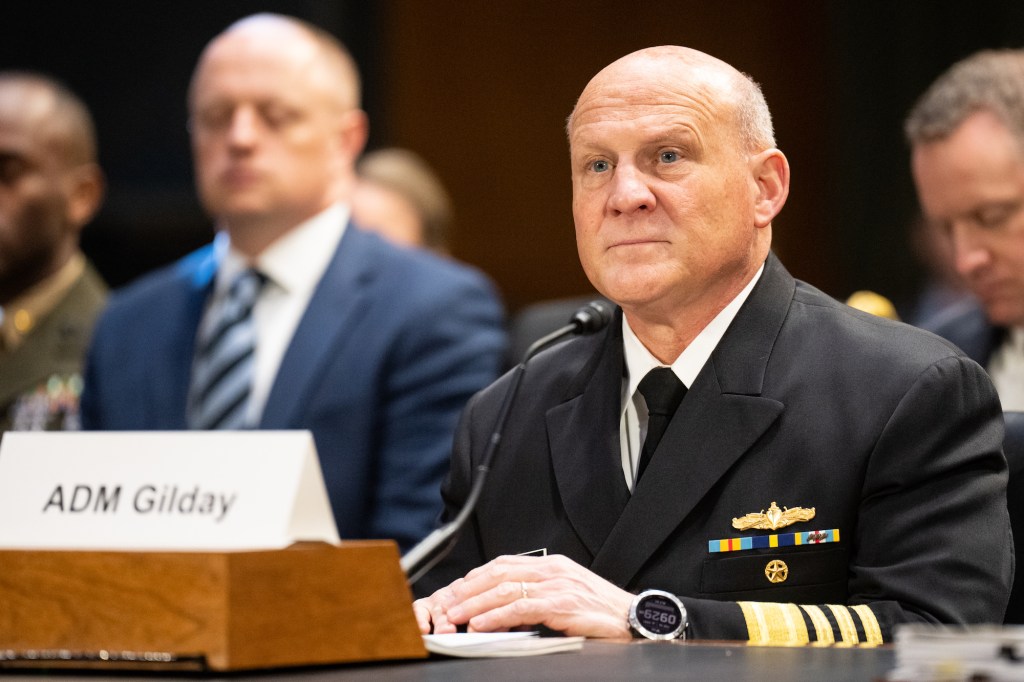Biden picks Adm. Lisa Franchetti to be first woman to lead the Navy, join Joint Chiefs of Staff
WASHINGTON – A woman could soon sit on the military’s Joint Chiefs of Staff for the first time after President Biden nominated Navy Adm. Lisa Franchetti Friday to become the new Chief of Naval Operations (CNO).
The current vice chief of naval operations with 38 years of service, Franchetti would be promoted to the No. 1 officer’s spot in the service after current CNO Adm. Mike Gilday retires next month.
“Throughout her career, Adm. Franchetti has demonstrated extensive expertise in both the operational and policy arenas,” Biden said in a statement announcing the nomination. “She is the second woman ever to achieve the rank of four-star admiral in the United States Navy.”
As head of the Navy, Franchetti would also become the first woman ever to sit on the Joint Chiefs of Staff, which includes each top officer in charge of the five service branches, as well a separate chief of the Joint Staff. The latter post is currently held by Army Gen. Mark Milley.
However, Franchetti may face a difficult confimation process, as Sen. Tommy Tuberville (R-Ala.) continues his hold on military confirmations in protest of the Pentagon’s policies allowing leave and paid travel for women to seek reproductive care such as in-vitro fertilization and abortion.
Biden urged the Senate “to move quickly” in confirming Franchetti, “along with the other military nominations currently on hold.” As of this week, there are more than 280 officers awaiting confirmation for their new roles.

“These leadership positions are far too important to delay filling while one Senator prioritizes his domestic political agenda over our military readiness,” Biden said.
Should Tuberville refuse to relent, the Navy could become the second service to go without a top leader after his hold left the Marine Corps without a commandant following the retirement of Gen. David H. Berger earlier this month.

Instead of a typical “change of command” ceremony, Berger held an unusual “relinquishment of command” ceremony on July 10, ending his term as the corps’ top officer without formally handing the position over to a successor.
The Marine Corps is now being led by Assistant Commandant Gen. Eric M. Smith, whom Biden nominated to succeed Berger, but who has yet to be confirmed.
Also awaiting confirmation is Air Force Gen. Charles Q. Brown, whom Biden nominated to succeed Milley as Joint Chiefs Chairman when he also retires next month.
So far, Tuberville has shown no willingness to make an exception to his boycott for Brown, despite the critical nature of the role as the US military’s senior-most officer.
The senator has recently held a series of talks with Pentagon officials – including Defense Secretary Lloyd Austin – who have urged him to relent in the name of national security.
On Wednesday, a panel of Pentagon policymakers privately briefed Congress on the women’s healthcare policies to which Tuberville objects, but the information was not enough to move the senator’s position on the matter.
Meanwhile, the Defense Department has shown no indication that it would consider a policy change to appease the Alabama senator, with top leaders – including Austin – maintaining that ensuring troops and their families have access to reproductive healthcare is a basic responsibility.
National Security Council spokesman John Kirby on Monday doubled down on the Pentagon’s view during a White House briefing Monday, calling it “the darn right thing to do.”
“Whether it’s about female service members or female family members, being able to count on the kinds of healthcare – and reproductive care, specifically – that they need to serve, that is a foundational, sacred obligation of military leaders,” he said.







